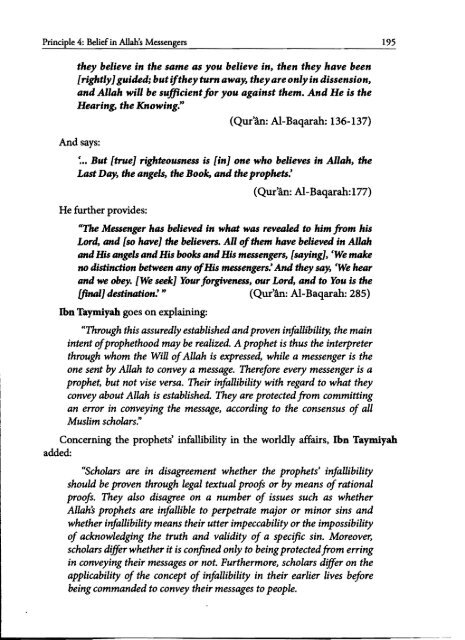Guide-to-Sound-Creed-A-Book-on-Muslim-Creed-and-Faith
Guide-to-Sound-Creed-A-Book-on-Muslim-Creed-and-Faith
Guide-to-Sound-Creed-A-Book-on-Muslim-Creed-and-Faith
You also want an ePaper? Increase the reach of your titles
YUMPU automatically turns print PDFs into web optimized ePapers that Google loves.
4: Belief in AlIah's<br />
195<br />
they believe in the same as you believe in, then they have been<br />
[rightly] guided; butifthey tum away, they are <strong>on</strong>ly in dissensi<strong>on</strong>,<br />
<strong>and</strong> Allah will be sufficientfor you against them. And He is the<br />
Hearing, the Knowing."<br />
(Qur'an: Al-Baqarah: 136-137)<br />
And says:<br />
~•• But [true] righteousness is [in] <strong>on</strong>e who believes in Allah, the<br />
Last Day, the angels, the <str<strong>on</strong>g>Book</str<strong>on</strong>g>, <strong>and</strong> the prophets:<br />
He further provides:<br />
(Qur'an: Al-Baqarah: 177)<br />
"The Messenger has believed in what was revealed <str<strong>on</strong>g>to</str<strong>on</strong>g> him from his<br />
Lord, <strong>and</strong> [so have] the believers. All ofthem have believed in Allah<br />
<strong>and</strong> His angels <strong>and</strong> His books <strong>and</strong> His messengers, [say;ng], 'We make<br />
no distincti<strong>on</strong> between any ofHis messengers: And they say, 'We hear<br />
<strong>and</strong> we obey. [We seek] Your forgiveness, our Lord, <strong>and</strong> <str<strong>on</strong>g>to</str<strong>on</strong>g> You is the<br />
[final] destinati<strong>on</strong>:" (Qur'an: Al-Baqarah: 285)<br />
Ibn Taymiyah goes <strong>on</strong> explaining:<br />
"Through this assuredly established <strong>and</strong> proven infallibility, the main<br />
intent ofprophethood may be realized. A prophet is thus the interpreter<br />
through whom the WiU ofAllah is expressed. while a messenger is the<br />
<strong>on</strong>e sent by Allah <str<strong>on</strong>g>to</str<strong>on</strong>g> c<strong>on</strong>vey a message. Therefore every messenger is a<br />
prophet. but not vise versa. Their infallibility with regard <str<strong>on</strong>g>to</str<strong>on</strong>g> what they<br />
c<strong>on</strong>vey about Allah is established. They are protected from committing<br />
an error in c<strong>on</strong>veying the message, according <str<strong>on</strong>g>to</str<strong>on</strong>g> the c<strong>on</strong>sensus of all<br />
<strong>Muslim</strong> scholars."<br />
C<strong>on</strong>cerning the prophets' infallibility in the worldly affairs, Ibn Taymiyah<br />
added:<br />
"Scholars are in disagreement whether the prophets' infallibility<br />
should be proven through legal textual proofs or by means of rati<strong>on</strong>al<br />
proofs. They also disagree <strong>on</strong> a number of issues such as whether<br />
Allah's prophets are infallible <str<strong>on</strong>g>to</str<strong>on</strong>g> perpetrate major or minor sins <strong>and</strong><br />
whether infallibility means their utter impeccability or the impossibility<br />
of acknowledging the truth <strong>and</strong> validity of a specific sin. Moreover,<br />
scholars differ whether it is c<strong>on</strong>fined <strong>on</strong>ly <str<strong>on</strong>g>to</str<strong>on</strong>g> being protected from erring<br />
in c<strong>on</strong>veying their messages or not. Furthermore, scholars differ <strong>on</strong> the<br />
applicability of the c<strong>on</strong>cept of infallibility in their earlier lives before<br />
being comm<strong>and</strong>ed <str<strong>on</strong>g>to</str<strong>on</strong>g> c<strong>on</strong>vey their messages <str<strong>on</strong>g>to</str<strong>on</strong>g> people.


